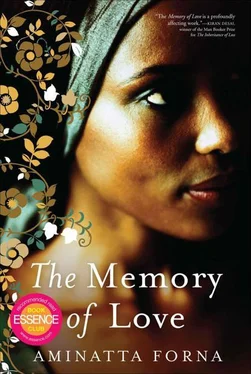One day perhaps he will return. He sees himself stooped under the sun, the prospect of his own death upon the horizon, searching for those places and people among whom he lived for those months and whom he had loved.
At other times he looks at Kate and he thinks of what he has left behind.
This is the time of year Adrian loves most on the coast. The birds have begun to arrive. A small flock of sandpipers, strutting along the waterline. He keeps a pair of binoculars on the table by the window and now raises them to his eyes. Almost daily there are redstarts, shrikes and yesterday a glimpse of a pied flycatcher. They will be headed south soon, to the coast of West Africa.
And yesterday, too, a letter from Kai, who writes erratically but with reasonable frequency and no longer avoids using the computer. This time, though, he returned to his preferred form. Enfolded into the letter was a document composed of eight handwritten sides of paper. Adrian opened it and began to read, carried it out on to the deck, into the early-morning sun. It was the story of Agnes, her husband and daughters, of Naasu and JaJa. Everything Adrian had known must be true but had never been able to discover, never been able to prove.
Everything he needed was there.
And there was something more, on the bottom of Kai’s letter, in the same blue Biro, as though for a few moments Kai had been called from the room and left his letter unattended on the table. Something Adrian saw only on his third reading. On the bottom right of the page.
A child’s careless scribble.
*
The child stops and stands to stare at her feet, as though seeing them for the first time. She grips sand between her toes and lifts one foot and then the other. One foot and then the other. She raises her shoulders and rocks her head between them, stamps her feet and laughs. The boy Abass goes to her, stretches out his arms to pick her up, but she evades him and runs away along the waterline. In three strides he has her; hands under her arms, he swings her up. Presently he sets her down and they walk away along the edge of the shoreline. Something left on the sand by the sea’s withdrawal catches their attention.
From high up on the beach Kai watches them as they begin to dig, applying themselves silently to the task. Abass, dark-skinned and angular. By contrast the girl is chubby and bronze, her hair a mass of black ringlets. Of the hair Kai’s aunts are delighted and despairing in equal measure, for it will not be bound, springs free of braids and defies their hair oils and combs. The child squirms beneath their hands and pulls out the bands and ribbons. Kai can see the salt crystals sparkling among the curls as the girl moves under the sun. This evening Kai’s aunts will tut at him as they begin work to undo the effects of sun, sea and salt upon the child’s hair. They will chide each other and vie for ownership of the comb, just as earlier that morning Kai’s aunts gently competed with one another to dress the child in her swimsuit, rub lotion upon her back and send her in search of her sandals. The whole expedition was alien to them, for they were village women from the arid interior, whose lives had been spent swathed in cloth against the heat and dust. But they enacted their roles and officiated over the preparation of the child with such conviction that Kai’s cousin, passing through the living room on her way to church, stopped to watch, twisted her mouth into a wry shape and exchanged with Kai a look as long as either of them dared.
They left in Old Faithful, bellies of fried plantains, smoked fish and pepper, pawpaw and lime. To Ileana’s. It has become a regular event, every fortnight or so, the trip to Malaika beach and to Ileana. The adults sit on chairs in the shade at the front of the house and watch Abass lead the little girl on to the rocks to search among the rock pools for aquatic life to capture and place in a makeshift aquarium on the steps of Ileana’s house until it is time to go and those creatures that are still swimming, crawling or hovering, by virtue of having survived, will have won their freedom. Kai watches. At the end of the rocks stands a lone black heron and Kai is returned to a time two years ago, a week after he had handed the curled newborn to a wet nurse. In those days he came and went between Adrian’s apartment and the neonatal ward, tending to both man and child.
He remembers standing inside the women’s ward observing how the wet nurse lifted the child from his arms and returned her to her own body, strapping the infant in the place between her breasts; he saw in the meticulousness of the woman’s movements the first evidence that she believed the child would survive. It would take time, but everything in the way the woman tucked and folded a cloth around the infant said time was something she had.
The day is coming to a close. They should be going if they are going to make it to the ferry port. Still, Kai prefers, for a few more moments, to watch the children play. The little girl dances on the tide line, Abass scoops up fistfuls of wet sand. And then whatever it is they have been seeking has been found, and the little girl laughs.
The laugh comes back to him, time and time again. It comes in the night, and at other unexpected moments, in his dreams — an echo of its pitch and timbre. But from the little girl it comes whole, pure and absolute. It is Nenebah. And in an instant the sound of that laugh can return Kai to a hillside overlooking the city eight years ago, to the moment following a lost joke, the playful bite during a morning’s embrace.
During his days at the hospital he pauses at occasional moments to think of her. One day last week a lizard dropped from a door lintel on to his shoulder and then on to the floor. The creature backed itself into a corner of the room, watched Kai out of one rotating eyeball, before hastening past him through the open door. The sort of occurrence that would have made Nenebah smile and search for hidden meanings. Kai walks from theatre to ward to staff room, crossing the courtyard under the glare of the sun. He arrives early in the day when the south wall of the building is purple with the morning glory that now grows there. By the time he leaves in the evening, the flowers are twisted sweet-papers. Yesterday he altered his route out of the building for no particular reason except that he felt like it, so it took him through the children’s ward, where he walked the length of the room while a paper plane circled in the air above him, carried on the eddying wind of the fan.
On other days Kai passes the room where Elias Cole died, one day before dawn two years ago. Nobody else had been present, so there was no saying in what manner he had faced his end. A preacher was called. The man administered a belated blessing, requested from Kai his taxi fare home and a donation to the church. Babagaleh cleared the room of Cole’s belongings. To Kai, Babagaleh gave the photograph of Nenebah, in which she appeared both to turn from and to confront the camera. Kai kept it alongside her other possessions and her clarinet. He passes the old house from time to time. It is closed up now. Babagaleh has returned home to the north and the love of his estranged wife.
Last night, the first time in many months, Kai woke during the night. He had been dreaming and, though the images of the dream were lost to him, he was left nevertheless with a sensation of well-being, of possibility. He left his bed and walked out into the yard. There was a breeze, unusual for the time of year, it was still early for the harmattan. It carried with it a hint of moisture, of night blooms and wet fruit. In the darkness the city dogs sang to each other. Somewhere in the long grass a frog called for an unknown mate. Kai breathed deeply. He sat down upon the step, his back to the house, and settled down to wait. And finally, above the houses, he saw rising slowly the muted, insistent radiance of dawn.
Читать дальше












